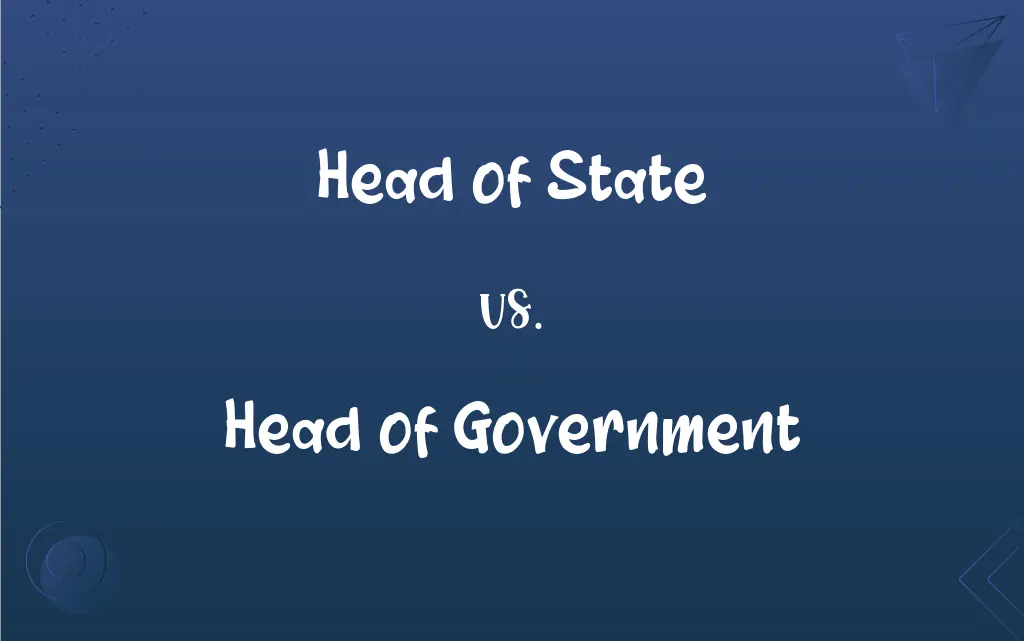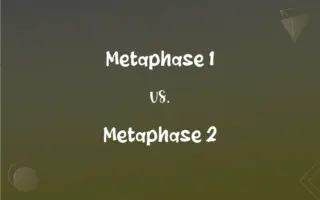Head of State vs. Head of Government: What's the Difference?
Edited by Aimie Carlson || By Harlon Moss || Updated on October 3, 2023
The head of state symbolizes a nation's unity and represents it ceremonially, while the head of government oversees the executive functions and daily administration of the state.

Key Differences
The title head of state is a symbolic representation of a nation, encompassing the ceremonial and unifying roles of a country. In contrast, the head of government is responsible for the daily administrative tasks and operations of the government, often making policy decisions.
In monarchies, the head of state is typically the king, queen, or monarch, who may reign for life or until abdication. The head of government, in these instances, could be a prime minister or another official who is appointed or elected for a specific term and handles the routine operations of governance.
In some republics, the roles of head of state and head of government converge in a single individual, such as the president in many countries. Yet, in other republics, they are distinctly separate, with a president as the head of state and a prime minister as the head of government.
It's essential to recognize the significant distinction between these two roles. The head of state focuses on the national unity, often partaking in ceremonial duties and diplomacy. Conversely, the head of government delves into the intricacies of policy-making, governance, and execution of laws.
Comparison Chart
Primary Role
Symbolic and ceremonial.
Executive and administrative.
ADVERTISEMENT
Representation
Embodies national unity.
Manages daily government affairs.
Typical Examples
Monarch, President.
Prime Minister, Chancellor.
Duration of Role
Often for life (in monarchies) or a fixed term.
Usually a set term or until parliamentary change.
Engagement in Governance
Limited to ceremonial or emergency powers.
Actively involved in policy and decision-making.
Head of State and Head of Government Definitions
Head of State
Engages in diplomatic roles on an international level.
The head of state welcomed the foreign delegation with a state dinner.
ADVERTISEMENT
Head of Government
Answers to the legislative body in parliamentary systems.
The head of government faced a vote of confidence in the parliament.
Head of State
The symbolic representative of a country's unity.
The Queen is the head of state in the United Kingdom.
Head of Government
The chief administrative officer of the executive branch.
The Prime Minister, as the head of government, introduced new policies.
Head of State
Typically remains neutral in daily political affairs.
As the head of state, she refrained from commenting on party politics.
Head of Government
Responsible for daily government operations.
The head of government chaired the cabinet meeting.
Head of State
Primarily undertakes ceremonial duties.
The head of state attended the international summit as a representative.
Head of Government
Engages actively in policy-making and legislation.
As the head of government, he proposed several economic reforms.
Head of State
Might possess emergency powers in certain systems.
In crises, the head of state can exercise special powers.
Head of Government
Might hold significant powers in presidential systems.
In that country, the president was both the head of state and the head of government.
FAQs
Who typically handles the daily operations of a government?
The head of government handles daily governmental operations.
Can one individual serve as both head of state and head of government?
Yes, in some systems, one individual can be both head of state and head of government.
Which role is more prevalent in monarchies, the head of state or head of government?
In monarchies, the monarch is typically the head of state, while another figure might be the head of government.
Who might face a vote of no-confidence in a parliamentary system?
In a parliamentary system, the head of government, such as a prime minister, might face a vote of no-confidence.
In a parliamentary republic, who often serves as the head of government?
In parliamentary republics, the prime minister often serves as the head of government.
Who is usually involved in the drafting of domestic policies?
The head of government is typically involved in drafting domestic policies.
In a situation where the head of state and head of government disagree on a policy, who has the final say?
This depends on the constitutional arrangement of the specific country. In most cases, the head of government would have the final say on policy matters, but the head of state might have certain veto or referral powers.
Who often has more ceremonial duties, the head of state or head of government?
The head of state often has more ceremonial duties.
Which position, the head of state or head of government, usually signs treaties?
Typically, the head of state signs treaties, representing the nation ceremonially.
Who represents the nation during state funerals or national celebrations?
The head of state typically represents the nation during state funerals, national celebrations, and other ceremonial events.
Who often chairs cabinet meetings, the head of state or head of government?
The head of government often chairs cabinet meetings.
Does the head of government typically have a role in military decisions?
Yes, the head of government often has a significant role in military decisions, especially in systems where they are also the commander-in-chief.
Can a monarch in a constitutional monarchy act as the head of government?
In most constitutional monarchies, the monarch acts as the ceremonial head of state, and the head of government role is separate, often filled by an elected or appointed official.
Who typically attends G7 or G20 summits representing a nation?
The head of government, such as the Prime Minister or President, usually attends global summits like the G7 or G20.
Which role is typically non-partisan and neutral?
The head of state is often expected to remain non-partisan and neutral.
Who typically appoints ministers or cabinet members in a government?
The head of government usually appoints ministers or members of the cabinet in most systems.
Which role, head of state or head of government, is more likely to interact with the judiciary?
The head of government is more likely to interact with the judiciary, especially in matters related to the implementation and interpretation of laws.
Can the head of state intervene in legislative matters?
In most systems, the head of state has limited intervention in legislative matters, often reserved for ceremonial or emergency roles.
In which system is the president often both the head of state and the head of government?
In presidential systems, the president is often both the head of state and the head of government.
In the event of a national emergency, who takes the lead?
While specifics can vary, often the head of government takes the lead in handling and decision-making during a national emergency, although the head of state might have reserved powers in certain situations.
About Author
Written by
Harlon MossHarlon is a seasoned quality moderator and accomplished content writer for Difference Wiki. An alumnus of the prestigious University of California, he earned his degree in Computer Science. Leveraging his academic background, Harlon brings a meticulous and informed perspective to his work, ensuring content accuracy and excellence.
Edited by
Aimie CarlsonAimie Carlson, holding a master's degree in English literature, is a fervent English language enthusiast. She lends her writing talents to Difference Wiki, a prominent website that specializes in comparisons, offering readers insightful analyses that both captivate and inform.































































